Two towers AB and CD are situated at a distance d apart, as shown in figure. AB is 20 m high and CD is 30 m high from the ground. An object of mass m is thrown from the top of AB horizontally with a velocity of 10 m/s towards CD. Simultaneously another object of mass 2 m is thrown fromt the top of CD at an angle of 60∘ to the horizontal towards AB with the same magnitude of initial velocity as that oft he first object. The two objects move in the same vertical plane, collide in mid air and stick to each other (i) calculate the distance between the towers and (ii) find the position where the objects hit the ground.
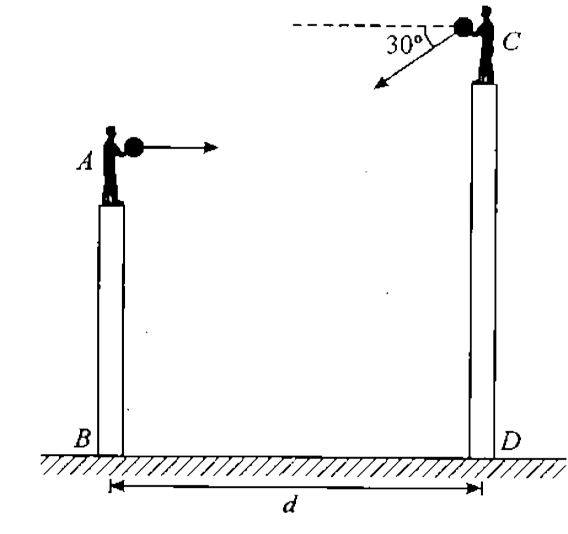
Method 1 : (a) Let t be the time taken for collision. For mass m thrown horizontally from A for horizontal motion,
PM=10t …(i)
For vertical motion, uy=0,sy=y,ay=g
Sy=uyt+12ayt2⇒y=12gt2...(ii)
vy=uy+ayt=gt ...(iii)
From mass 2m thrown from C, for horizontal motion
QM=[10cos60∘]t⇒QM=5t ...(iv)
For vertical motion : uy=10sin60∘=5√3)
⇒vy=5√3)+gt ...(v)
ay=g.Sy=y+10,S=ut+12at2
⇒y+10=s√3t+12gt2 ...(vi)
From (ii) and (vi), 12gt2+10=s√3t+12gt2⇒t=2√3s
BD=PM+MQ
=10t+5t
=15t=15×2√3
=10√3=17.32m
(b) Applying the conservation of linear momentum (during collision of the masses at M) in the horizontal direction, we have
m×10−2m10cos60∘
=3m×vx⇒10m−10m=3m×vx⇒vx=0
Since the horizontal momentum comes out to be zero, the combination of masses will drop vertically downwards
and fall at E,BE=PM=10t=10×3√3=11.547m
Method 2 : Acceleration of AandC both is 9.8ms−2 downward.
Therefore, the relative acceleration between them is zero, i.,e., the relative motion between them will be a straight line.
Now assuming A to be at rest, the condition of collision will be that →vCA=→vC−→vA = relative velocity of Cw.r.t.A should be along CA
→vA=10ˆi
→vB=−5ˆi−5√3ˆj
→vBA=−5ˆi−5√3ˆj−10ˆi∴→vBA=−15ˆi−5√3ˆj
∴tan60∘=d10ord=10√3m.
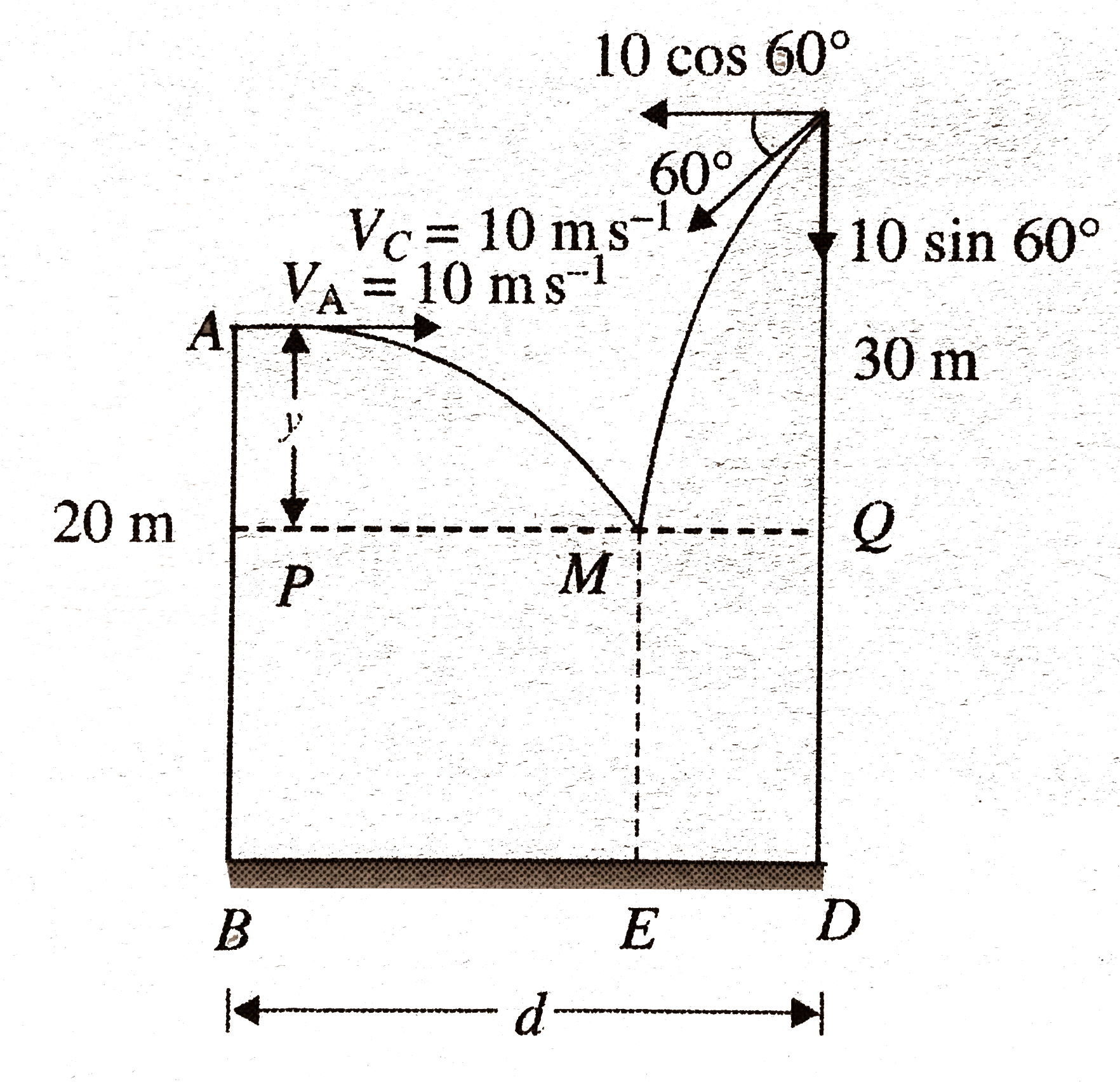 ,
,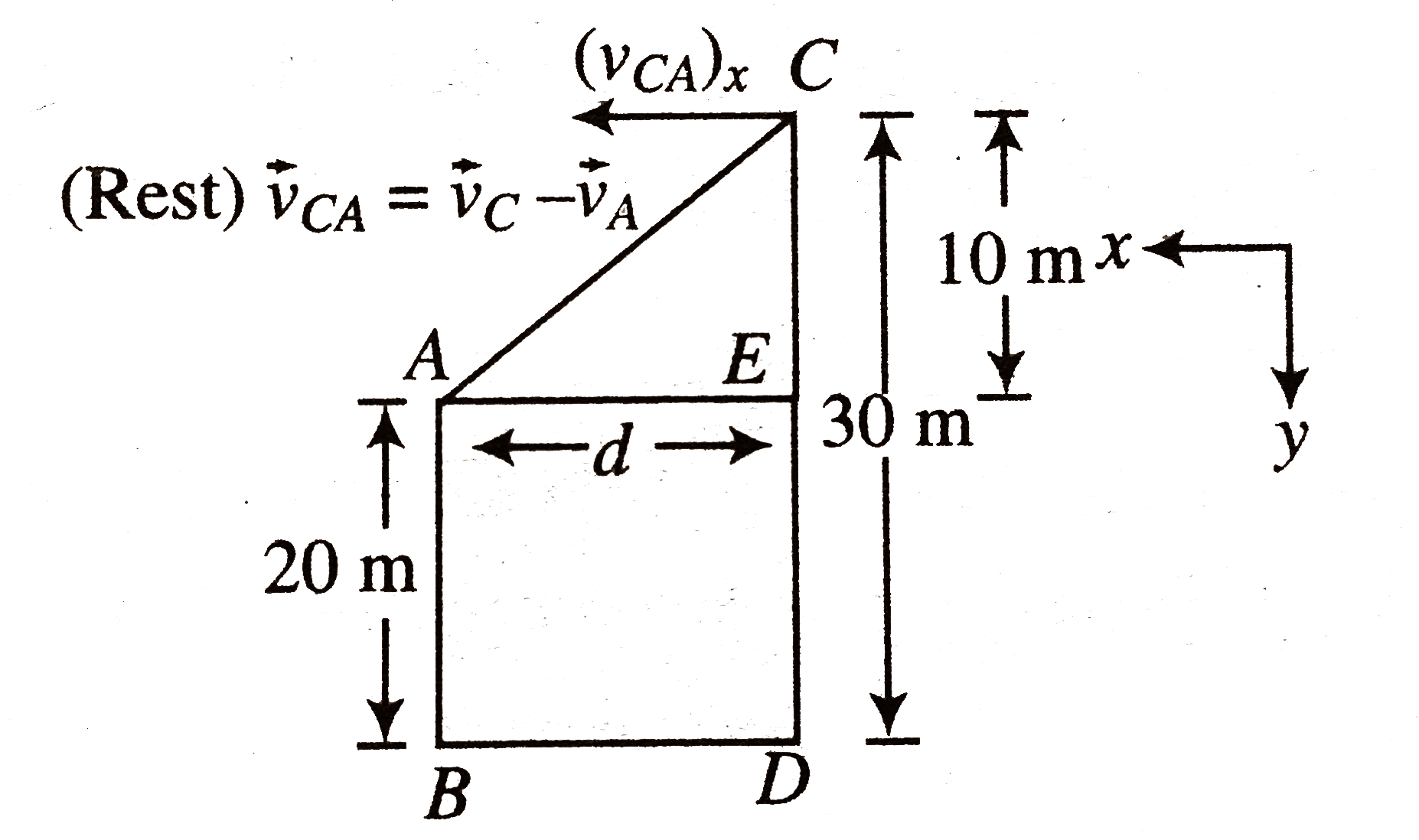 ,
,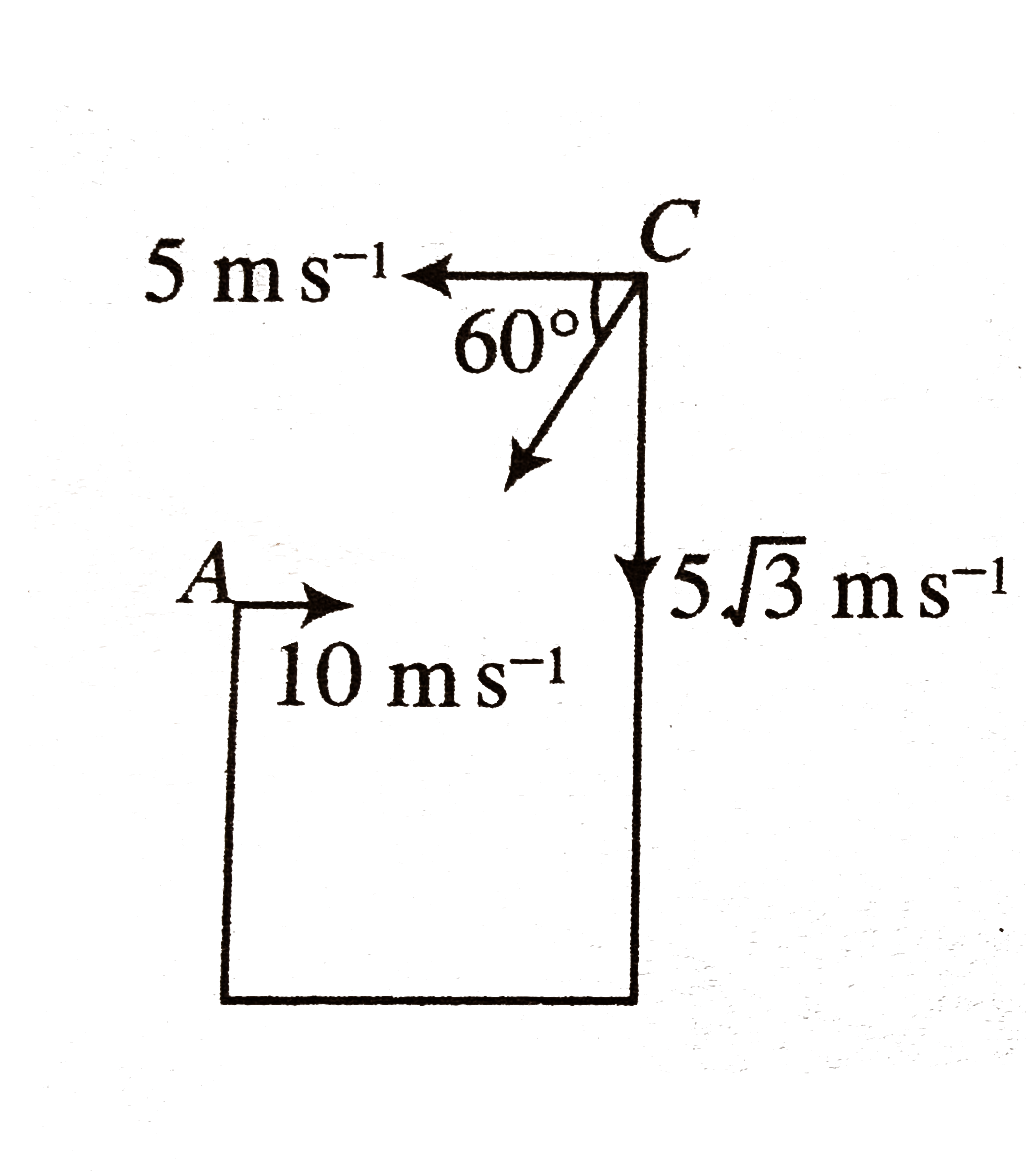 ,
,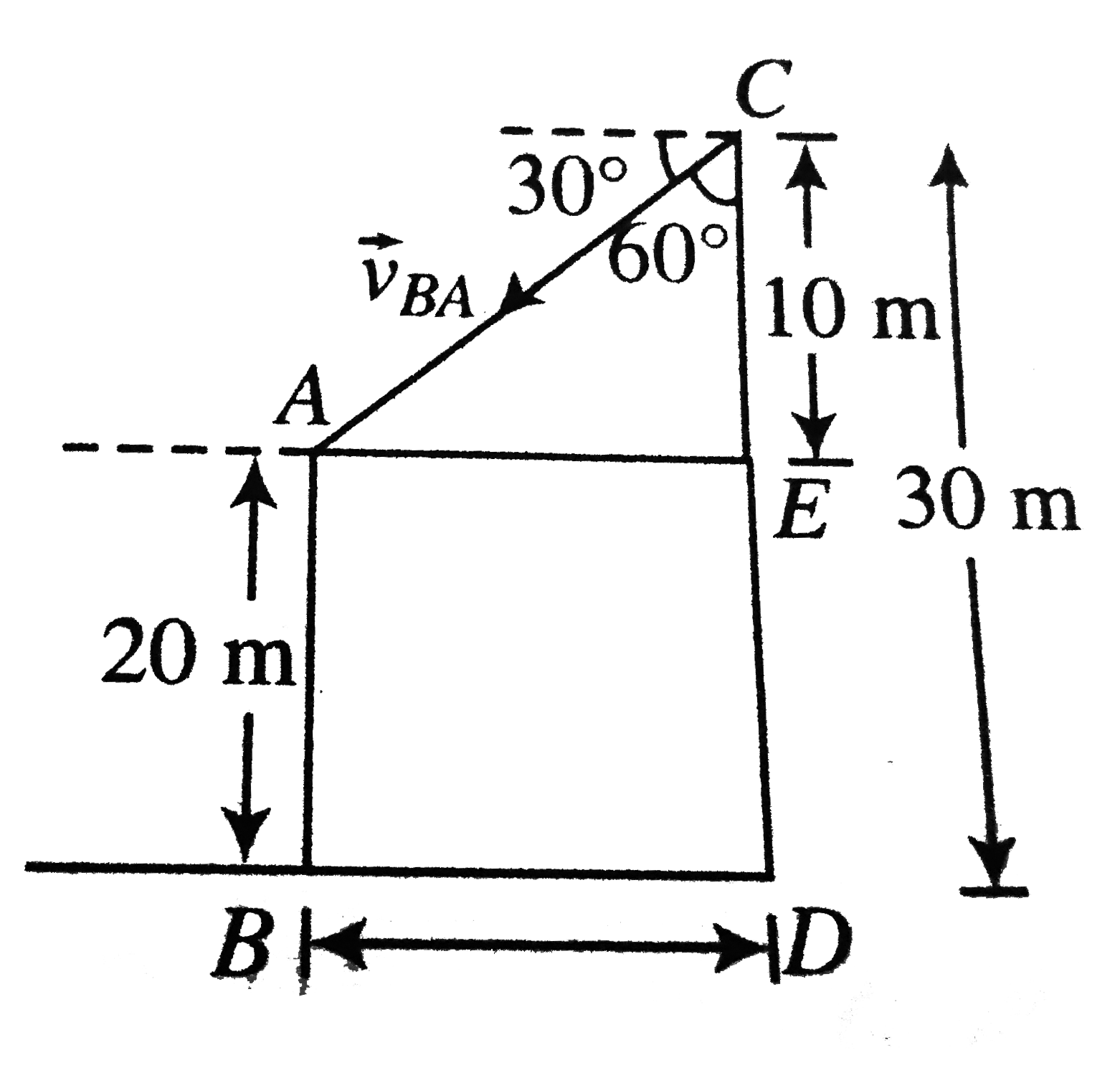 .
.
Topper's Solved these Questions
- BOOK - CENGAGE PHYSICSCHAPTER - KINEMATICS-2EXERCISE - Exercise 5.115videos
KINEMATICS-2
- BOOK - CENGAGE PHYSICSCHAPTER - KINEMATICS-2EXERCISE - Exercise 5.225videos
KINEMATICS-2
- BOOK - CENGAGE PHYSICSCHAPTER - KINEMATICS-2EXERCISE - Exercise Integer9videos
KINEMATICS-2
- BOOK - CENGAGE PHYSICSCHAPTER - KINEMATICS-1EXERCISE - Integer9videos
KINEMATICS-1
- BOOK - CENGAGE PHYSICSCHAPTER - KINETIC THEORY OF GASESEXERCISE - Compression2videos
KINETIC THEORY OF GASES
Similar Questions
Two towers AB and CD are situated at a distance d apart, as shown in figure. AB is 20 m high and CD is 30 m high from the ground. An object of mass m is thrown from the top of AB horizontally with a velocity of 10 m/s towards CD. Simultaneously another object of mass 2 m is thrown fromt the top of CD at an angle of 60∘ to the horizontal towards AB with the same magnitude of initial velocity as that oft he first object. The two objects move in the same vertical plane, collide in mid air and stick to each other (i) calculate the distance between the towers and (ii) find the position where the objects hit the ground.
 View Solution
View SolutionTwo towers AB and CD are situated a distance d apart as: shown in Fig. 1E.139 (a). AB is 20 m high and CD is 30 m high from the ground. An object of mass mis thrown from the top of AB horizontally with a velocity of 10 m/s towards CD.
Simultaneously another object of mass 2m is thrown from the ·top of CD at an angle of 60∘ to the horizontal towards AB with the same magnitude of initial velocity as that of the_ first' objects . The two objects move in the same vertical plane, collide in mid-air and stick to each other.
Calculate the distance d between the towers.
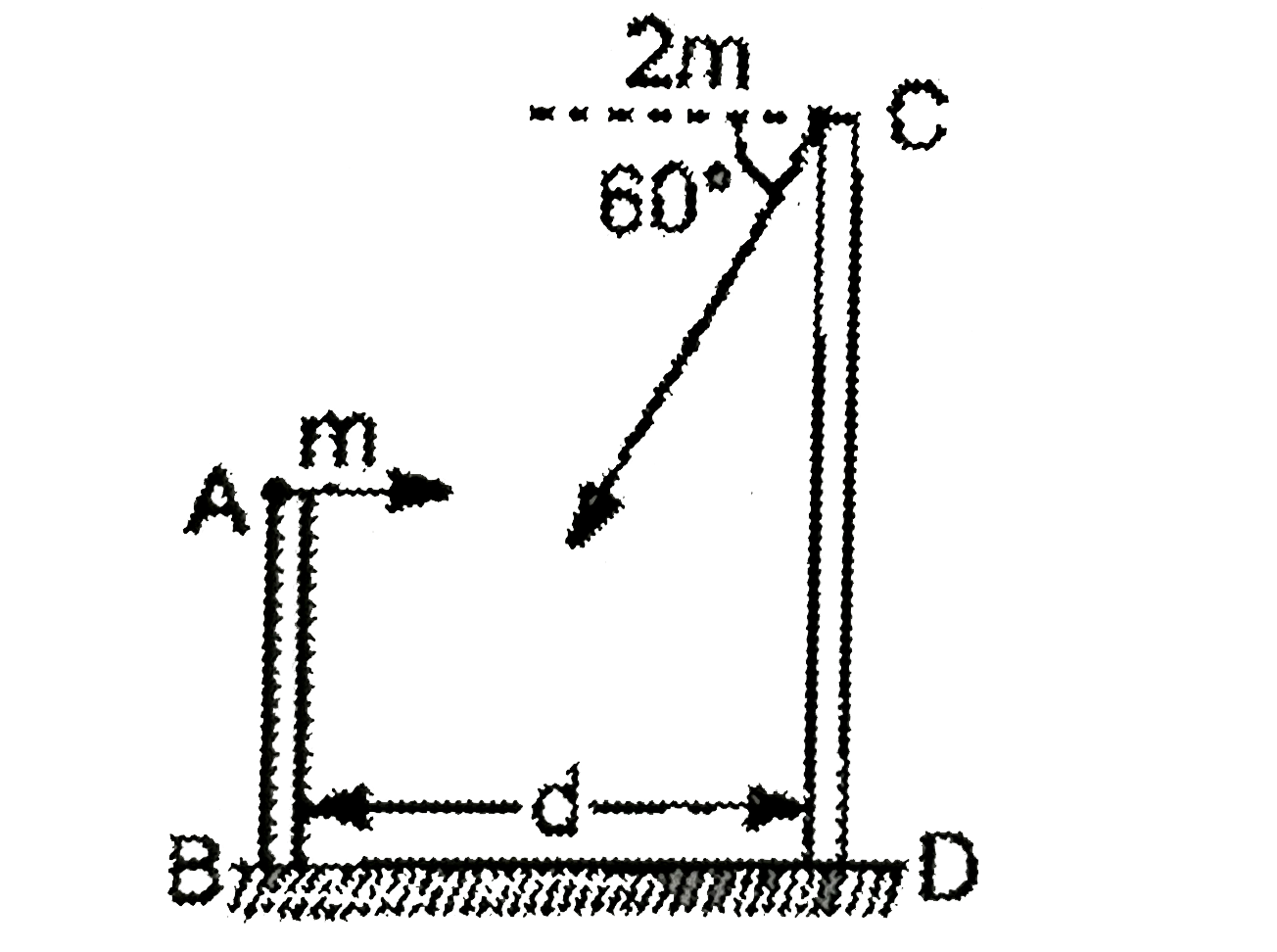 View Solution
View Solution
Knowledge Check
- Question 1 - Select One
A stone is thrown from the top of a tower at an angle of 30∘ above the horizontal level with a velocity of 40 m/s. it strikes the ground after 5 second from the time of projection then the height of the tower is
A20 mB25 mC40 mD55m - Question 2 - Select One
A ball of mass m is thrown at an angle of 45∘ to the horizontal,, from the top of a 65m high tower AB as shown in Fig. at t=0. Another identical ball is thrown with velocity 20m/s horizontally towards AB from the top of a 30m high tower CD1s after the projection of the first ball. Both the balls move the same vertical plane. If they collide in mid-air,
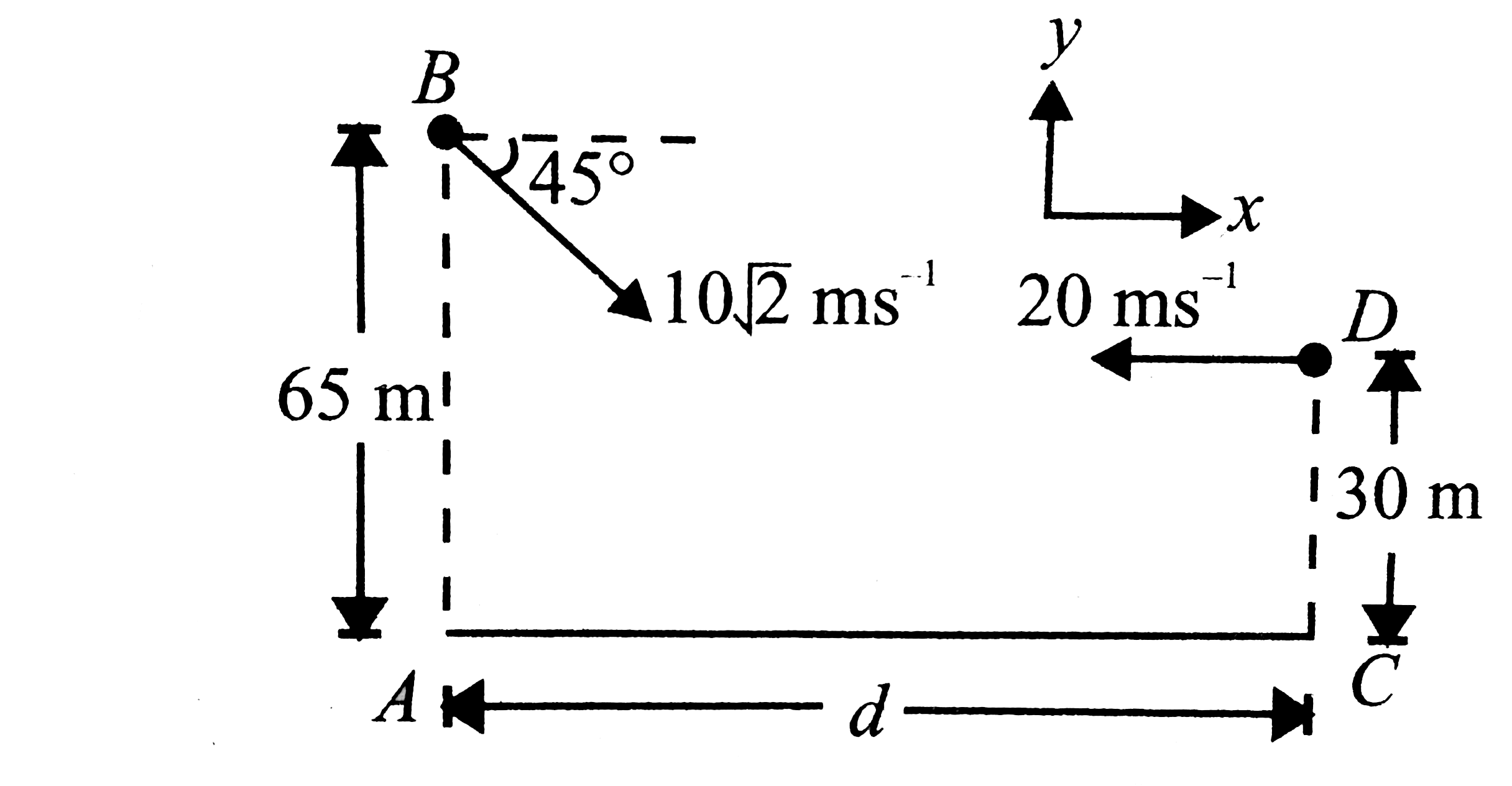
the distance AC isA20mB30mC40mD20m - Question 3 - Select One
A ball is thrown upwards from the top of a tower 40m high with a velocity of 10m/s. Find the time when it strikes the ground. Take g=10m/s2.
A4sB−28sC12sD−2s
Two towers AB and CD are situated a distance d apart as shown in Fig. 5.45. AB is 20m high and
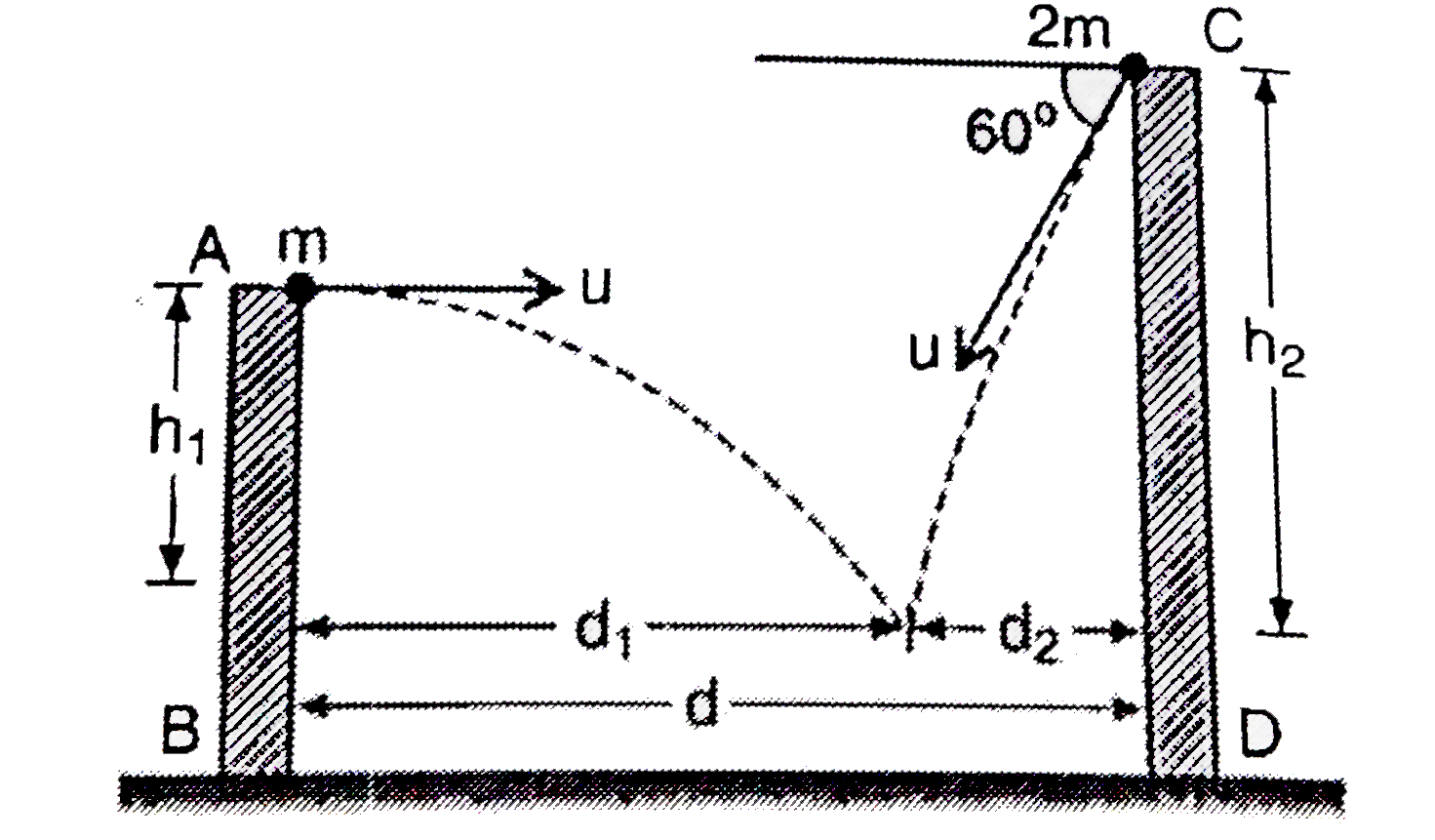
CD is 30m highfrom the ground . An object of mass m is thrown from the top of AB horizontally with a velocity 10m/s towards CD. simu ltaneously another object of mass 2 m is thrown from the top of CD at an angle of 60∘ to the horizotnal towards AB with the same magnitude of initial velocity as that of the first object. the two objects move in the same vertical plane, clollide in mid air and stick to each other, (a) Calcu late the distance d between the towers and (b) fin the position where the objects hit the ground.View SolutionA ball is thrown from the top of a building with a velocity of 10 m/s and returns with a velocity of 30 m/s to the ground. Find the height of the building.
View SolutionA particle of mass m is thrown horizontally from the top of a tower and anoher particle of mass 2m is thrown vertically upward. The acceleration of centre of mass is
View SolutionA ball of mass m is thrown at an angle of 45∘ to the horizontal,, from the top of a 65m high tower AB as shown in Fig. at t=0. Another identical ball is thrown with velocity 20m/s horizontally towards AB from the top of a 30m high tower CD1s after the projection of the first ball. Both the balls move the same vertical plane. If they collide in mid-air,
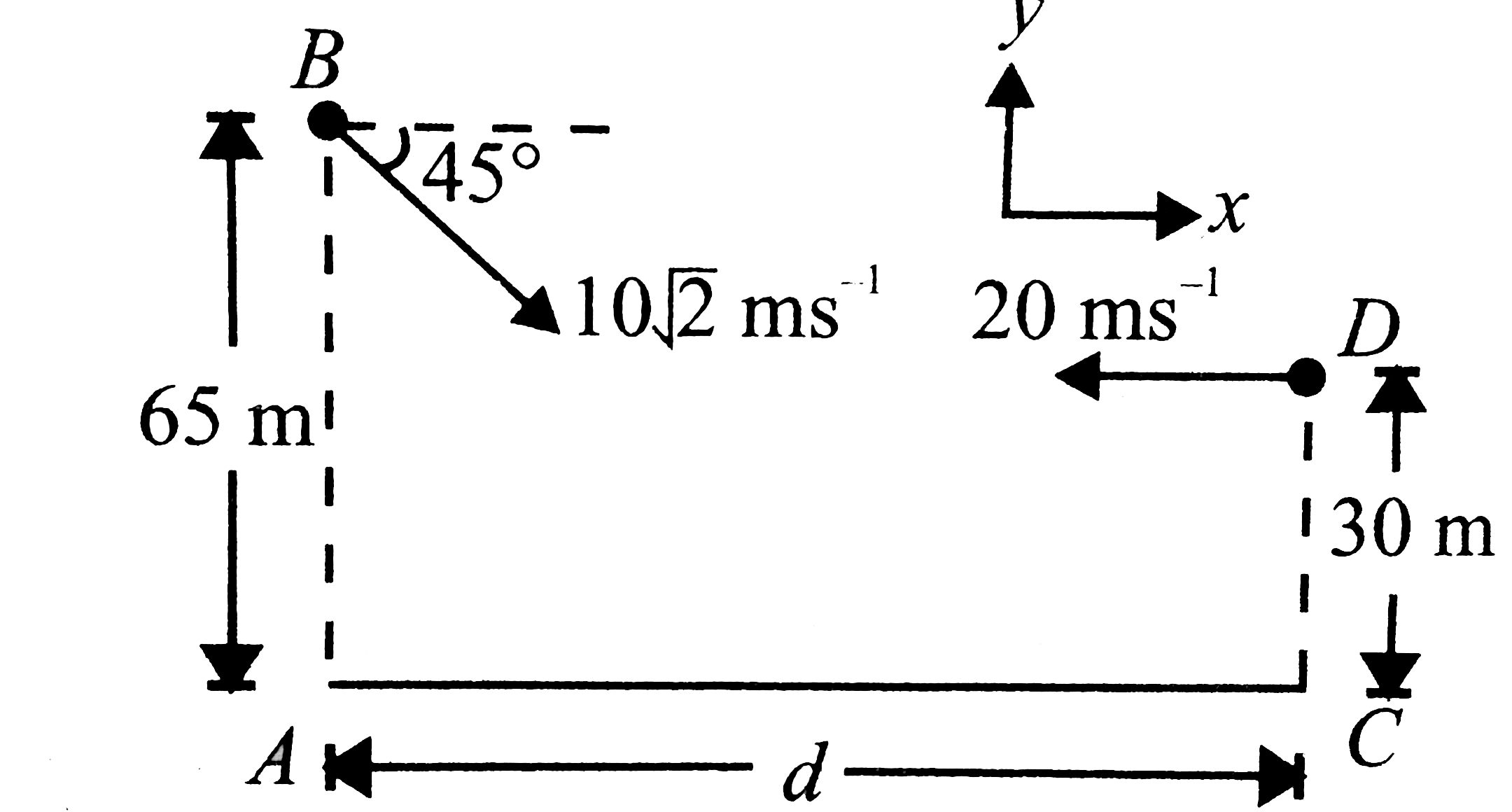
the two balls will collide at time t=View SolutionA ball of mass m is thrown at an angle of 45∘ to the horizontal,, from the top of a 65m high tower AB as shown in Fig. at t=0. Another identical ball is thrown with velocity 20m/s horizontally towards AB from the top of a 30m high tower CD1s after the projection of the first ball. Both the balls move the same vertical plane. If they collide in mid-air,
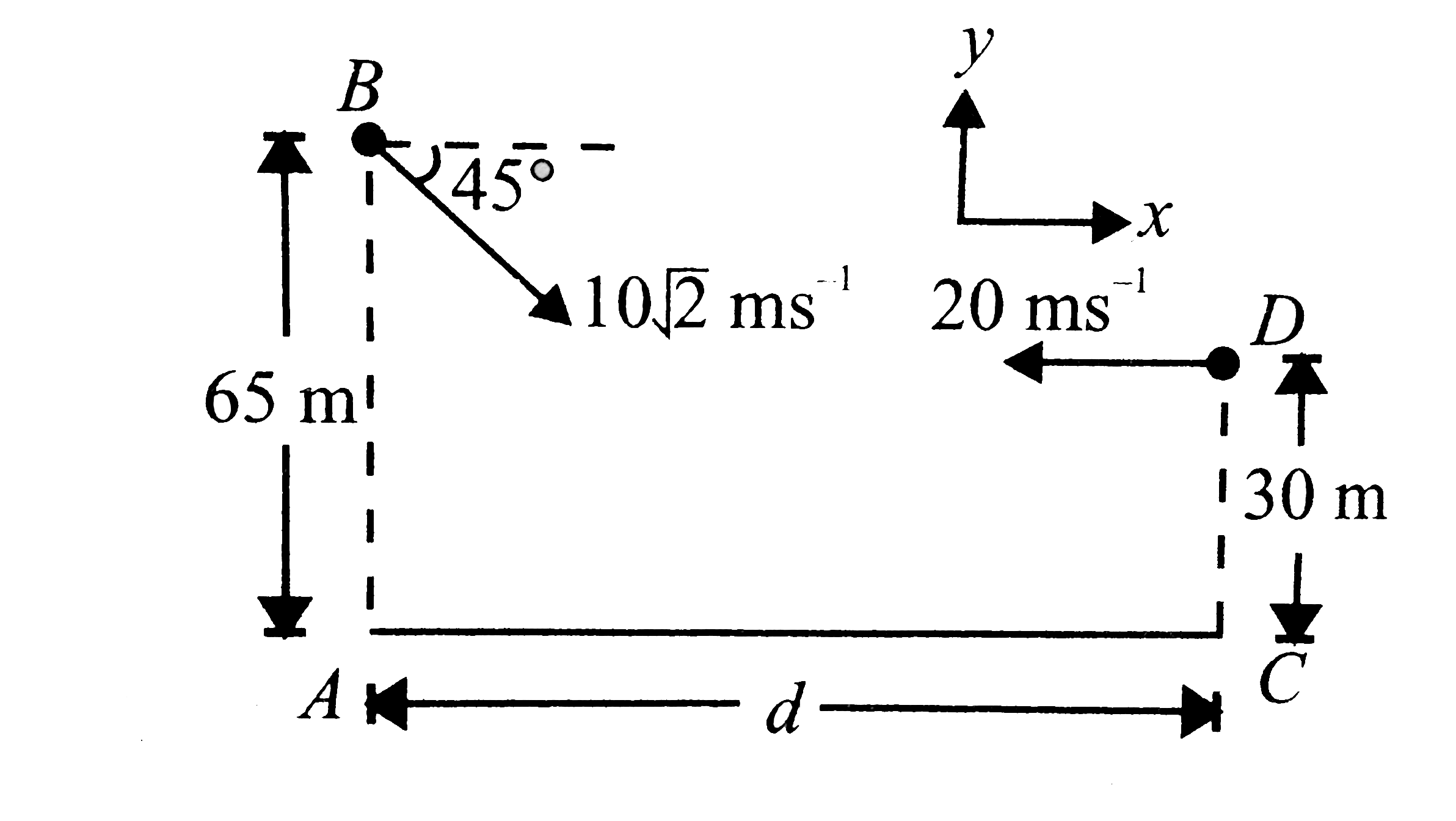
. the velocity of combined ball just after they struck together isView Solution

